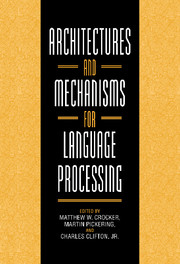Book contents
- Frontmatter
- Contents
- Contributors
- Preface
- 1 Architectures and Mechanisms in Sentence Comprehension
- Part I Frameworks
- Part II Syntactic and Lexical Mechanisms
- Part III Syntax and Semantics
- 9 On the Electrophysiology of Language Comprehension: Implications for the Human Language System
- 10 Parsing and Incremental Understanding During Reading
- 11 Syntactic Attachment and Anaphor Resolution: The Two Sides of Relative Clause Attachment
- 12 Cross-Linguistic Psycholinguistics
- Part IV Interpretation
- Author Index
- Subject Index
10 - Parsing and Incremental Understanding During Reading
Published online by Cambridge University Press: 03 October 2009
- Frontmatter
- Contents
- Contributors
- Preface
- 1 Architectures and Mechanisms in Sentence Comprehension
- Part I Frameworks
- Part II Syntactic and Lexical Mechanisms
- Part III Syntax and Semantics
- 9 On the Electrophysiology of Language Comprehension: Implications for the Human Language System
- 10 Parsing and Incremental Understanding During Reading
- 11 Syntactic Attachment and Anaphor Resolution: The Two Sides of Relative Clause Attachment
- 12 Cross-Linguistic Psycholinguistics
- Part IV Interpretation
- Author Index
- Subject Index
Summary
This chapter discusses a range of findings from our eye-tracking research in relation to current theories of parsing. First, we discuss findings that implicate extremely rapid semantic processing and findings that suggest that the degree of semantic processing affects the ease of recovery from misanalysis. We then provide an analysis of theories of initial parsing decisions that emphasises two dimensions: whether they can draw upon all available information or not; and whether they attempt to select or foreground the analysis that is most likely to be correct at the point of ambiguity. We next discuss a range of evidence from our laboratory that provides support for theories that do not attempt to select the most likely analysis. The evidence may support an account where at least some parsing decisions are driven by syntactic information alone. Alternatively, it may support an account in which the parser draws upon all available information, but where its goal is to select the most informative analysis, not the most likely one.
Immediate Effects of Plausibility
One of the clearest conclusions of research into language comprehension is that a great deal of processing occurs incrementally. Thus, lexical access, syntactic analysis, and semantic interpretation are not delayed, but begin as soon as the relevant word is heard or read (e.g., Marslen-Wilson, 1973; Just & Carpenter, 1980). The strongest of these findings is that the processor does not delay in providing a semantic interpretation for a sentence fragment as a whole: such semantic processing of course requires that lexical and syntactic processing have already occurred.
- Type
- Chapter
- Information
- Architectures and Mechanisms for Language Processing , pp. 238 - 258Publisher: Cambridge University PressPrint publication year: 1999
- 1
- Cited by



